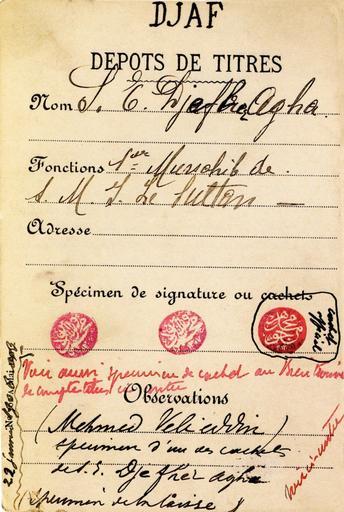MAKE A MEME
View Large Image

| View Original: | Stocks_and_Bonds_Deposit_Card_of_Cafer_Agha.jpg (860x1280) | |||
| Download: | Original | Medium | Small | Thumb |
| Courtesy of: | www.flickr.com | More Like This | ||
| Keywords: salt araştırma saltaraştırma salt research saltresearch salt online saltonline cafer ağa caferağa cafer agha caferagha esham tahvilat emanet fişi emanetfişi stocks bonds deposit card depositcard osmanlı bankası osmanlıbankası ottoman bank ottomanbank text document writing drawing sketch Stocks and bonds deposit card of Cafer Agha Westernization, and particularly the Constitution of 1908, had initiated a movement in favor of the abolition of slavery, promoting the idea that slaves should be given equal rights as freemen. When chief eunuch of the harem Cevher Agha was hanged in 1909, his estate at the Ottoman Bank became a legal conundrum. According to Islamic law, the heir of a slave was his master; however, if slavery were to be considered illegal, the relatives could claim the estate, or in their absence –which was a frequent occurence in the case of eunuchs– by the Public Trustee. Therefore, the estates of palace eunuchs would sometimes be claimed by more than one entity: on the one hand, the Privy Purse, representing their master the sultan, and on the other, the Public Trustee. The bank's lawyer would thus be forced to tackle this legal issue. SALT Research Ottoman Bank Archives Cafer Ağa’nın esham ve tahvilat emanet fişi II. Meşrutiyet’in ilanıyla köleliğin kaldırılması çabaları ortaya çıkmış, kölelerin hür insanların haklarına sahip olmaları gerektiği savunulmaya başlamıştı. II. Abdülhamid’in baş musahibi (harem ağası) olan Cevher Ağa 1909’da idam edildiğinde, Osmanlı Bankası’ndaki terekesi hukuki bir çelişki yarattı. Zira İslam hukukuna göre bir kölenin varisi efendisiydi. Oysa köleliğin yasal olmadığı kabul edildiği takdirde malının varislerine, varisleri yoksa da -ki bir harem ağasının varisinin olmaması normaldi- Beytülmâl’e (devlet hazinesi) kalması gerekiyordu. Dolayısıyla vefat eden harem ağalarının terekelerine birden fazla talip çıkabiliyordu. Bir taraftan efendisini temsil eden Hazine-i Hassa, diğer taraftan da Beytülmâl. Bu da banka açısından ciddi bir hukuk ve kavram kargaşasına neden oluyordu. Stocks and bonds deposit card of Cafer Agha SALT Araştırma Osmanlı Bankası Arşivleri Stocks and bonds deposit card of Cafer Agha Westernization, and particularly the Constitution of 1908, had initiated a movement in favor of the abolition of slavery, promoting the idea that slaves should be given equal rights as freemen. When chief eunuch of the harem Cevher Agha was hanged in 1909, his estate at the Ottoman Bank became a legal conundrum. According to Islamic law, the heir of a slave was his master; however, if slavery were to be considered illegal, the relatives could claim the estate, or in their absence –which was a frequent occurence in the case of eunuchs– by the Public Trustee. Therefore, the estates of palace eunuchs would sometimes be claimed by more than one entity: on the one hand, the Privy Purse, representing their master the sultan, and on the other, the Public Trustee. The bank's lawyer would thus be forced to tackle this legal issue. SALT Research Ottoman Bank Archives Cafer Ağa’nın esham ve tahvilat emanet fişi II. Meşrutiyet’in ilanıyla köleliğin kaldırılması çabaları ortaya çıkmış, kölelerin hür insanların haklarına sahip olmaları gerektiği savunulmaya başlamıştı. II. Abdülhamid’in baş musahibi (harem ağası) olan Cevher Ağa 1909’da idam edildiğinde, Osmanlı Bankası’ndaki terekesi hukuki bir çelişki yarattı. Zira İslam hukukuna göre bir kölenin varisi efendisiydi. Oysa köleliğin yasal olmadığı kabul edildiği takdirde malının varislerine, varisleri yoksa da -ki bir harem ağasının varisinin olmaması normaldi- Beytülmâl’e (devlet hazinesi) kalması gerekiyordu. Dolayısıyla vefat eden harem ağalarının terekelerine birden fazla talip çıkabiliyordu. Bir taraftan efendisini temsil eden Hazine-i Hassa, diğer taraftan da Beytülmâl. Bu da banka açısından ciddi bir hukuk ve kavram kargaşasına neden oluyordu. Stocks and bonds deposit card of Cafer Agha SALT Araştırma Osmanlı Bankası Arşivleri | ||||